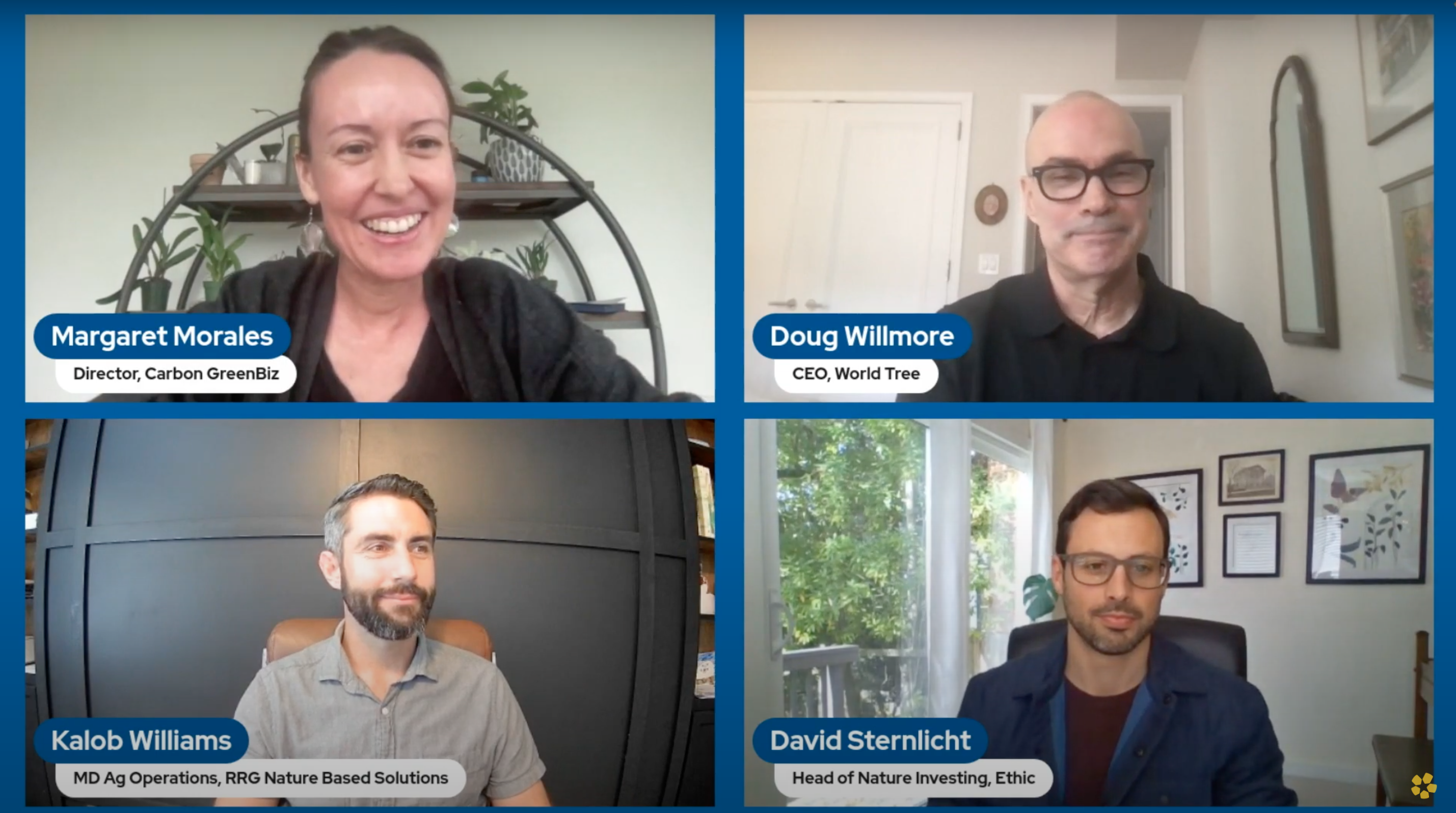Highlights from a Webinar Co-Hosted by World Tree and SOCAP
A collaborative agroforestry project in Costa Rica provides a case study for using capital to drive climate action and community impact. With the La Cabaña project, financial and environmental organizations are coming together to shape nature-based solutions for global challenges.
Leaders from the organizations discussed the project and its ripples of impact during a recent webinar co-hosted by World Tree and SOCAP. The webinar, “Nature’s Blueprint: Biodiversity & Sustainability Through Innovative Land Strategies,” featured:
- David Sternlicht, Head of Nature Investing at Ethic
- Kalob Williams, Managing Director of Agricultural Operations at Renewable Resources Group Nature-Based Solutions
- Doug Willmore, CEO at World Tree
- Margaret Morales, Director of Carbon at GreenBiz Group, moderator
Morales said La Cabaña can set the stage for similar forestry projects by showing it’s possible to invest in renewable timber production that also enhances carbon sequestration and socio-economic rural development. “There are so many excellent nature restoration projects that exist but struggle to get off the ground because of a lack of finance,” she said.
At World Tree, Willmore and his colleagues look to change that by creating nature-based solutions to global challenges and funding them with private capital. He said La Cabaña is an example of what can happen when financial returns and impact merge to support biodiversity and environmental sustainability.
The project also addresses the current unsustainable and singular nature of land use for agriculture, forestry, and livestock. “They’re separate,” Willmore said. “We need to bring those three back together on the same piece of property. … By bringing them back together, we start the process of creating something that has a positive impact on the environment.”
The project is a natural fit for Ethic, an impact investing platform supporting projects that restore degraded landscapes and earn a financial return for investors. Sternlicht said projects like La Cabaña demonstrate the resilience of regenerative agriculture during a worsening climate crisis and will attract a growing number of investors. “With more precipitation and climate and weather event volatility, a regenerative agriculture system with healthy soils will retain water much, much more efficiently and weather droughts much better,” Sternlicht said.
Expanding the practice of regenerative agriculture also will help protect the planet’s biodiversity, he said. “We’ve discovered that when biodiversity drops on managed landscapes, it also drops on protected native landscapes,” Sternlicht said. “We can protect all the native spaces we want, but if biodiversity continues to drop on our agricultural spaces, forestry spaces, livestock spaces, it will continue to drop worldwide.”
At RRG Nature-Based Solutions, Williams and others work with companies and investors as they transition to regenerative agriculture and protect biodiversity. The firm helped World Tree with the technical design of La Cabaña and will handle on-the-ground operational management of the project.
Increased biodiversity helps reduce the need for fungicides, improves soil health, and reduces irrigation need, Williams said. “Biodiversity is a massive tool within a productive system that increases resilience, decreases costs, and therefore increases profitability.”
Williams said a broader transition to regenerative agriculture will require knowledge and skill development on the local level. “The prescriptions aren’t going to work the same way in each location. We need to develop local knowledge and local ability to adapt these systems to the specificity of the local context, soils, and climate.”
But the long-term benefits — for people, the planet, and the bottom line — make that challenge necessary and worthwhile. “More research recently — both empirical evidence but also academic research — has shown that these regenerative systems are actually more profitable than the conventional systems,” Williams said.





